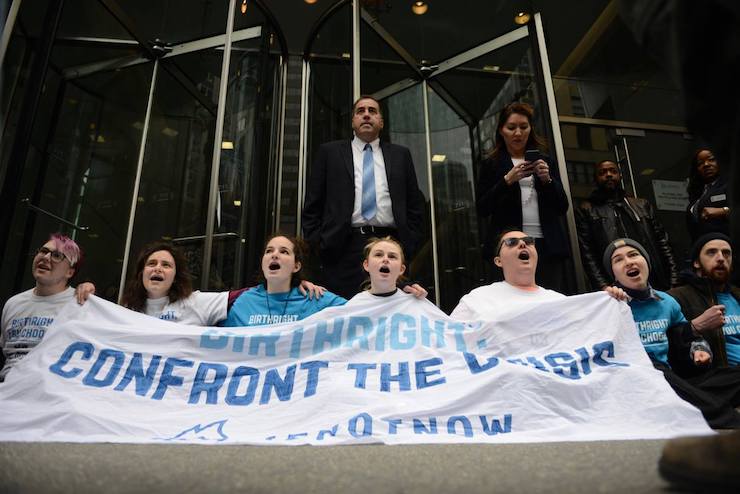The recent campaigns taking aim at Birthright and the American political establishment are more than symbolic — they are sowing the seeds of a powerful resistance movement against Israel’s occupation.
By Oren Kroll-Zeldin

Passover is a celebration of freedom, justice, and liberation. In Hebrew it is referred to as zman heruteynu, the season of our freedom. As I reflected during my Passover seder this year on what it means for Jews today to be free, I thought back to an oft-cited quotation from Jewish American poet and social activist Emma Lazarus that says: “Until we are all free, we are none of us free.” Her ethical plea for intersectional Jewish social justice implores us to understand that one’s freedom is deeply connected to the freedom of another.
Passover is also about hope. And though hope for a just and sustainable peace in Palestine-Israel seems to be at an all-time low, particularly in the aftermath of Israel’s recent elections, the Passover holiday gives us an opportunity to focus on the places where hope emerges and a more just future seems possible.
Though in moments of despair it may be hard to find optimism, I want to offer a sliver of hope: throughout history, social movements seeking justice and liberation successfully achieved their demands for social and political change, even in what may appear to be the darkest of times. And emerging from the current contentious political climate is a rapidly-developing social movement working to end Israel’s occupation of the Palestinian territories.
My research on diaspora Jewish anti-occupation activism shows that numerous groups and individuals are mounting pressure on the institutional Jewish spaces that uphold support for Israel’s occupation, forcing a fundamental shift in Jewish American attitudes toward Israel and Zionism. It is these activists, and the grassroots social movement they are helping to build with allies from other communities and progressive politicians, that is beginning to apply pressure that is swinging the political pendulum in a new direction.
Today, in response to more than half a century of Israeli occupation and rising political divisions in American Jewish institutions, there is a social movement of multiple organizations, collectives, and individual activists who are working together and separately to end Israel’s occupation of the Palestinian territories, abolish mainstream Jewish community’s support for the occupation, and call attention to the freedom, dignity, and justice that Palestinians demand.
One prominent example is IfNotNow’s “Not Just a Free Trip” campaign targeting Birthright. In a well-coordinated and highly publicized action, dozens of activists protested outside Birthright’s offices in New York demanding that the organization expose trip participants to the harsh realities of everyday life for Palestinians. Fifteen activists were arrested, prompting IfNotNow to escalate their calls to action and encourage young Jews to boycott Birthright until it exposes participants to the occupation.
As a partial response to the success of this campaign, J Street announced it will offer a free trip that will take participants to Israel as well as to Palestinian cities and an Israeli settlement in the West Bank in an attempt to challenge the Birthright narrative.
Meanwhile, the membership of left-wing Jewish organizations in the United States like IfNotNow, J Street, and Jewish Voice for Peace is only growing. These three groups form the core of a large cadre of American Jews who are looking for ways to pressure both Israel and the U.S. to end Israel’s occupation. Their organizing caused several progressive members of Congress to turn down an AIPAC-sponsored trip to Israel, shaking the foundation of the lobby’s dominance over the Israel conversation in American politics.

More recently, numerous politicians, including Democratic candidates for President, refused to attend the annual AIPAC conference in Washington, fearing that attending the conference would alienate the progressive base of the party and jeopardize their chances at the Democratic nomination for President. While this may seem like a minor accomplishment, it shows that the social movement is forming more significant cracks in unequivocal American support for Israel.
The campaigns taking aim at Birthright and the American political establishment are more than a symbolic attempt to expose people to the realities of occupation — they are sowing the seeds of a powerful resistance movement that is gaining momentum and developing a fine-tuned strategy. This movement recognizes that where there is power, there must also be resistance.
In a time of great persecution and un-freedom for so many people around the world, the Passover holiday gives us an opportunity to reflect on the hope that this social movement can be successful in truly ushering in zman heruteynu, not just for Jews but for all people. And as is the case with all social movements, once the voices of dissent grow loud enough, nothing will be able to stop it.
Oren Kroll-Zeldin is the Assistant Director of the Swig Program for Jewish Studies and Social Justice and Assistant Professor in the Department of Theology and Religious Studies at the University of San Francisco. He is on Twitter @orenkz.
